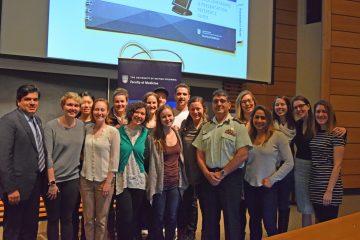On February 15, fourth-year UBC medical students from Vancouver, Kelowna, Victoria and Prince George listened to a special presentation by Colonel Rakesh Jetly, Senior Psychiatrist and Mental Health Advisor to the Surgeon General for the Canadian Armed Forces (CAF), to learn more about the CAF’s approach to mental health in the workplace, post-traumatic stress disorder (PTSD), directions in care and their future role as physicians.

Col. Jetly with fourth-year medical students and Dr. Gurdeep Parhar, Executive Associate Dean, Clinical Partnerships and Professionalism, Faculty of Medicine.
After 10 years of combat, Col. Jetly – who served in Israel, Rwanda and Afghanistan –says that both the military and society have come a long way in terms of understanding and treating mental health conditions.
“During WWI, the treatment plan for ‘shell shock’ or PTSD as we understand it now was more rest and naps,” he said. “Today we know better and we also know that not everyone who experiences trauma will go on to develop PTSD.”
CAF soldiers now undergo primary, secondary and tertiary resilience training to help them deal with stress and increase confidence, while helping to de-stigmatize mental illness. Troops practice performance psychology techniques like controlled breathing, positive self-talk and goal setting – therapies that can help anyone suffering from a mental health condition.
The ongoing challenge in society as a whole says Col. Jetly continues to be the stigma surrounding mental health.
“But I prefer not to use the word stigma because it entails a wrongdoing,” he said. “I prefer to look at it as barriers to care and ‘stigma’ is only one of many reasons why people don’t seek care.”
He went on to say that other reasons can be that the person doesn’t believe they have a condition, or because of institutional barriers like long waitlists to see clinicians or financial barriers due to lack of Medical Service Plan (MSP) coverage.
Breaking these barriers is an important role that health professionals can play in terms of making a difference says Jetly.
“As physicians, we are our patients’ best advocacy,” he said. “We need to use our voices and seize the moment to give mental health the same kind of attention that heart disease and cancer receives.”
Beyond gaining a better understanding of the health issues that can arise for soldiers, medical students also learned about the vast resources available for war veterans that will optimize their care.
Like many of the attending learners, Naomi Roome, fourth-year medical student, was impressed with Col. Jetly’s presentation, saying it left both a personal and professional impact.
“Both sides of my great-grandparents served in WWI and my grandpa was training for WWII when the war ended,” she said. “The lecture gave me a deeper perspective of the impacts of PTSD and mental health in the workplace – it also provided me with skills that I will be able to use in my future practice.”